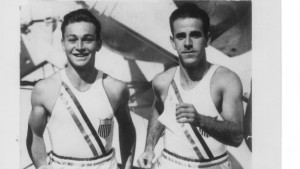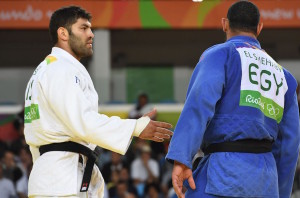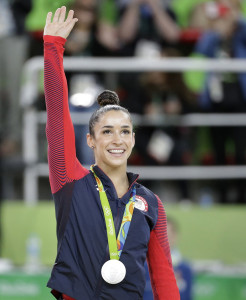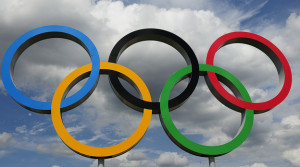As the 2016 Summer Olympics wind down, it is interesting to note that this is the 80th anniversary of the notorious Berlin Olympics of 1936. Sometimes called the Nazi Olympics, the Nazi propaganda machine was at full throttle as the world watched a precisely choreographed event whose showmanship blinded much of the world to the realities of the Nazi regime.
In fact, that Olympics was the first time that the Olympic torch was relayed from Olympia to the game site.
A stadium-still standing and used as a premiere soccer venue-was built. One half-Jewish German athlete, fencer Helene Mayer whose father was Jewish, participated, although many of the best were summarily refused and Germany sacrificed many medals. However, Germany allowed foreign Jews and African Americans to participate.The city was cleaned up for the Olympics with anti-semitic signs and actions hidden away and newspaper headlines toned down until the world’s eyes were no longer focused on Germany.
 Avery Brundage, American Olympic Committee chairman and later a member of the executive committee of The America First movement, removed qualified Jewish athletes from competition in the 400 meter relay, dashing the dreams of star sprinters Marty Glickman, who became a well known sportscaster, and Sam Stoller. They were replaced by African Americans Jesse Owens and Ralph Metcalfe.
Avery Brundage, American Olympic Committee chairman and later a member of the executive committee of The America First movement, removed qualified Jewish athletes from competition in the 400 meter relay, dashing the dreams of star sprinters Marty Glickman, who became a well known sportscaster, and Sam Stoller. They were replaced by African Americans Jesse Owens and Ralph Metcalfe.
Glickman later said that Owens told Brundage to “let them run.” He did not. Glickman and Stoller many years later received the Olympic MacArthur medal in an apologetic gesture for their unfair treatment .
Ironically, Owens won four gold medals and Metcalfe won two. After the second day of competition, Goebbels wrote in his diary, “We Germans won a gold medal, the Americans three, of which two were Negroes. That is a disgrace. White people should be ashamed of themselves.”
 Since those Olympics in 1936, the world has become smaller while the competition has become stronger with more countries, more sports, more competitors. But the anti-Jewish feelings-often called anti-Israel-still exist as shown by the refusal of the team from Lebanon to ride the same bus as the Israeli team; the refusal of an Egyptian competition to shake hands with his Israeli counterpart after their judo match, which the Israeli had won; and the forfeiting of a match by a Saudi Arabian competitor so that she would not have to compete with an Israeli in the next match.
Since those Olympics in 1936, the world has become smaller while the competition has become stronger with more countries, more sports, more competitors. But the anti-Jewish feelings-often called anti-Israel-still exist as shown by the refusal of the team from Lebanon to ride the same bus as the Israeli team; the refusal of an Egyptian competition to shake hands with his Israeli counterpart after their judo match, which the Israeli had won; and the forfeiting of a match by a Saudi Arabian competitor so that she would not have to compete with an Israeli in the next match.
And was it an accident that Facebook users couldn’t add Israel’s Olympic flag to their profiles?
 However, in 2016, Jewish athletes were still allowed to triumph. Gymnast Aly Raisman, who dedicated her medals in the 2012 London Olympics to the slaughtered 1972 Israeli athletes ( Ironically Brundage was president of the IOC), earned a silver medal for all round gymnastics. Israelis Yarden Gerbi and Or Sasson took home bronze in judo for Israel.
However, in 2016, Jewish athletes were still allowed to triumph. Gymnast Aly Raisman, who dedicated her medals in the 2012 London Olympics to the slaughtered 1972 Israeli athletes ( Ironically Brundage was president of the IOC), earned a silver medal for all round gymnastics. Israelis Yarden Gerbi and Or Sasson took home bronze in judo for Israel.
Other Jewish athletes are expected to either win medals or help their teams to medals.
Books about the Olympics available in the synagogue or public library:
Bacharach, The Nazi Olympics: Berlin 1936
Brown, The Boys in the Boat
Dostis, Ten Gold Medals
Goldman, Jewish Sports Stars:athletic heroes past and present
Mandell, The Nazi Olympics
Wechsler, Day by Day in Jewish Sports History
image: “Olympic Rings” © Dept of Culture, Media, & Sport used with permission via Creative Commons License.
- Is It Passover Yet? - Thu, Apr 18, 2024
- MESH Report April 9, 2024 - Thu, Apr 11, 2024
- Guess Who? - Wed, Mar 13, 2024


Such an enlightening article about our struggle as Jews. Much to think about.Thank you.